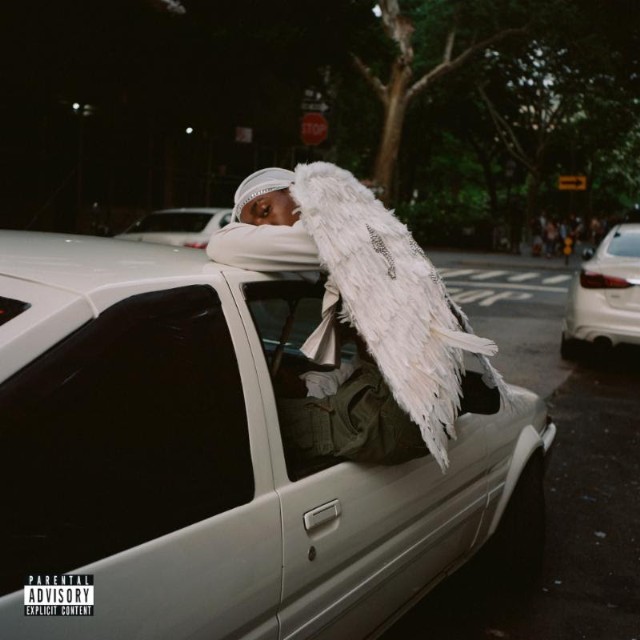"People try to put us down by saying 'she's doing the most' or 'he's way too much,' but why would we want to do the least?" Janet Mock asks in the opening minute of "Jewelry," one of the lead singles from Blood Orange's new album Negro Swan. The interlude is one of several that find Mock, who recently became the first transgender woman of color to write and direct a television show (FX's Pose), speaking about the importance of feeling comfortable to show up in the world and claim space as a marginalized person. In response, the songs on Negro Swan take the shape of resistance. It molds the discomfort of existing while feeling so unwelcome into a blueprint for healing.
Negro Swan hinges on the way Blood Orange, the forward-facing identity of Dev Hynes, forces the listener to sit with the bittersweet past and inconvenient present realities. The tracks unfurl in parts as ideas are spread across a production palate that ranges from upbeat funk to languid jazz. The colorful '80s pop that has largely defined Hynes’ aesthetic is present, but the tempo is slowed and an atmospheric, soulful ombre is played up in its stead. As far as lyrics go, Negro Swan finds Hynes playing the role of artist, historian, and anthropologist all rolled into one. As the songs unfurl, his focus tightens.
Hynes' acclaimed 2016 album Freetown Sound was a rendering of being black and queer and trying to survive. Cupid Deluxe, released in 2013, was a nostalgic and danceable love letter to New York City while his debut (as Blood Orange), 2011's Coastal Grooves, captured the legacy of Harlem's ball culture and the city during that era. With Negro Swan, Hynes zooms in on the micro-concerns plaguing these communities when the party's over and you're left to your own thoughts once again. Hynes wrote that he created this album with "[his] own and many types of black depression" in mind as well as "the ongoing anxieties of queer/people of color."
Opener "Orlando" begins with a snippet of city sounds before crescendoing into a deceptively cheery groove. The warmth of Hynes' production could make anyone gloss over the lyrics that describe the times he was sucker punched as a kid. "First kiss was the floor," he sings in his delicate high tenor. Hynes has been open about the insecurities he developed as a result of bullying, and it's an apt place to start an album that is ultimately about finding release. Similarly, "Take Your Time" is an earthy meditation on being present propelled by flute, while the bright synths and vibrant guitar riff of "Charcoal Baby" contour the fight against loneliness and the subsequent breaking. The stripped-back "Runnin'" highlights a life lived in a state of perpetual restlessness, but the mighty voice of the experimental musician Georgia Anne Muldrow offers comfort: "Hold on, you’re gonna be OK, everybody goes through it."
On album standout "Chewing Gum," Hynes adds his own clever twist to the recent resurgence of classic Memphis hip hop in modern releases. In addition to tapping Harlem's A$AP Rocky, he calls on Memphis rapper Project Pat and puts them atop a skittering sample of "Lookin' For Da Chewin" by another Memphis rhymer, Kingpin Skinny Pimp. The result is an unexpected song of surrender. On the hook, Hynes begs, "Tell me what you want from me," while Rocky contributes a mellowed (though somewhat unrelated) verse. Pat gets the chopped and screwed treatment set against celestial synths before the song cuts off abruptly and the gospel is ushered in.
The stunning "Holy Will" pulls its potency straight from the heavens above: A bone-chilling falsetto cracks through electronic swirls in a rendition of the Clark Sisters hymn "Center Of Thy Will." Ian Isiah prays, "Lord, I just want to be rooted and grounded in thee/ Lord place me, I want to be centered in thy will," as a chorus grows around him. It's one of the album's most breathtaking arrangements and honors the way gospel has historically offered respite from struggle and heartache to black folks; some traditions run through our veins whether we’re in church or not.
Those two songs in sequence illustrate what Hynes does best: put disparate musical genres back in dialogue with each other, as if to prove that artistic expression -- particularly modes of black artistic expression -- exist on a continuum rather than in isolation. The juxtaposition of hip-hop and old-school gospel, or spoken word and sung lyrics, creates connective tissue between past and present, between ideas and the language we use to articulate them.
Never greedy with the spotlight, Hynes is a savvy curator and knows when to let others do the speaking. On "Hope," an optimistic breakup song, he lets his guests do much of the vocal lifting. Tei Shi appeals to a lover for clarity while Puff Daddy offers reassurances. The closing monologue presents the hip-hop mogul in a rare moment of vulnerability as he talks through the difficulties of truly being open to love. "What is it going to take for me not to be afraid to be loved the way I really want to be loved? … I’m scared to really feel that," he confesses, holding a mirror to himself and to us as well.
The Beatles may have told us all you need is love, but few have answers for what to do in a world that refuses to love you back, when it feels more committed to your destruction than your survival. Hynes doesn't portend to offer solutions to our dilemmas, but he underscores the anxiety with suggestions about the healing qualities of self-love and of allowing ourselves to be loved by others. With the help of Mock he sprinkles Negro Swan with seeds to water and consider. As the album wraps up, things come full circle. The acoustic resolution "Smoke" is a quick burst of affirmations. "Bounce in my hair, I'm pretty as fuck," Hynes declares on the opening lines, a gentle guitar strumming beneath him. Finally, he shapes his final words, a parting mantra repeated over and over: "The sun comes in, my heart fulfills within."
If swans are totems of beauty and grace, then the Negro Swan is the one whose elegance goes unseen and unappreciated. But through this album, Hynes raises the voices of outcasts and outsiders. In seeking to explore "the lights we can try to turn on within ourselves with a hopefully positive outcome of helping others out of their darkness," he is transformed into a beacon. He offers a safe space where listeners can come to feel validated and maybe, just maybe, find the tools to mend. Negro Swan may be born of trauma, but it is ultimately the magical music of resilience, of courage under fire, of resounding triumph.
Negro Swan is out 8/24 via Domino. Pre-order or pre-save it here.






